Source: Silicon Rabbit
This is the most dramatic election in American history, and it is also the moment when Silicon Valley investors jointly decide the future of American technology.On November 4, Beijing time, the voting results of the 60th presidential election in the United States will be announced. Former Republican President Donald Trump will compete with Democratic Vice President Kamala Harris in the final.
The US election has always been the focus of the world, but this year, the people in Silicon Valley behind the scenes broke the norm and took to the candidate rally podium to personally promote the direction of this election.
Microsoft founder Bill Gates, famous venture capitalist Marc Andreessen, PayPal co-founder Peter Thiel and dozens of other Silicon Valley investors have all come out to bet on the future. With Elon Musk openly supporting Republican Trump, Silicon Valley, which has been loyal to the Democratic Party for decades, has also shown a tendency to split due to different party inclinations.
Why do people in Silicon Valley bet on the major candidates? How will the changes in the US election affect Silicon Valley? In the next four years, can the wind of innovation in Silicon Valley continue to flow freely? We may be able to find out from the words and policy tendencies of the two candidates during the recent campaign.
1. Silicon Valley "rebellion" Democratic Party Musk "fights" Bill Gates
"The enemy of my enemy is my friend." In the past four years, Musk has obviously figured this out.
It is hard to imagine that Musk, who is now on good terms with Trump, once described him as a "cold loser" and even resigned from the Economic Advisory Committee because of his election as president. But four years later, Musk turned around and called Trump a "tough president" and became the first technology madman in Silicon Valley to publicly support Trump.
What brought Musk and Trump together was their common enemy - the Democratic Party.
Rather than saying that Silicon Valley bosses sincerely support the Republicans, it is better to say that they hate a series of technology policies that affect Silicon Valley during Biden's administration - raising taxes, strengthening supervision, splitting giants, antitrust investigations, etc., all of which are real threats to the actual interests of Silicon Valley bosses. In contrast, the Republicans have instead raised the slogan of innovation freedom and reduced government intervention.
For a time, people in Silicon Valley could not tell whether the Democratic Party, which has always supported innovation, has become conservative, or the conservative Republican Party has become open.
But with Musk's personal participation, the political landscape in Silicon Valley has quietly changed, and the party conflicts under the undercurrent have also surfaced. The camps supporting different political parties are splitting Silicon Valley.
Silicon Valley people who support the Democratic Party feel that the Democratic Party's immigration policies, advocacy of investment in technological innovation, and improvement of science and technology education, and many other proposals are basically consistent with the spirit of Silicon Valley in the general direction. At the same time, they are worried that Trump's populist economic policies will intensify greater social contradictions.
The two factions have their own opinions, but there will only be one winner in the election. In order to win, the bigwigs of both parties desperately spent money, time and resources to support the party they support.
Musk has donated at least $75 million to his pro-Trump organization America Pac, and even proposed a "vote and get money" campaign; AI startup Palanti co-founder and venture capitalist Joe Lonsdale personally promoted America Pac's fundraising activities and took the initiative to donate $1 million. In addition, Sequoia Capital investor Shaun Maguire, cryptocurrency venture capitalist Cameron Winklevoss, and the two brothers Tyler Winklevoss have all defected to the Trump camp and provided millions to tens of millions of dollars in financial support.
"Biden has given Silicon Valley many reasons to oppose: his Treasury Department plans to tax unrealized capital gains, ending the American free enterprise system; the Federal Trade Commission often bullies the left wing for not liking businesses, slowing down transactions and harming innovation, which is a nightmare for startup founders and employees." Palanti co-founder Joe Lonsdale said.
Cryptocurrency venture capitalist Cameron Winklevoss feels that people who support Bitcoin, cryptocurrency and business should vote for Trump, and he will end the Biden administration's crackdown on cryptocurrency.
Harris' supporters are not to be outdone. Bill Gates revealed that he recently donated about $50 million to nonprofits supporting Harris' presidential campaign. Y Combinator investor Jessica Livingston donated $5 million; Ripple co-founder Chris Larsen donated more than $11.8 million. It is reported that Kamala Harris has raised nearly $1 billion in huge campaign funds in the past three months.
Harris' supporters believe that the Democratic Party still has room for salvation. Compared with Biden, Harris can better understand the innovative economy and promote the competitiveness of the United States in the global market. "We strongly agree with Harris' economic philosophy. Now is the era to encourage innovation and ensure that American leading companies dominate various industries around the world." Ripple co-founder Chris Larsen believes that Harris grew up in the innovative economy, and she will correct the mistakes made by the Biden administration in cryptocurrency policy and play a key role in the direction of the innovative economy.
It is not only the people in Silicon Valley that pushed this election to a climax, but also the social technology platforms in Silicon Valley.
In addition to X and Instergram that appeared in previous years, Tiktok and podcasts have become the main battlefields of the new election public opinion war, which means that the direction of social media has changed.
"I think every presidential election is a microcosm of the media landscape." Ray Chao, senior vice president of Vox Media, mentioned that the main battlefields of the 2008 election were Facebook and the main battlefields of the 2016 election were Twitter.
This time, precise algorithm recommendations, endless explosive content, and overlapping user groups are driving Tiktok to become a new battlefield for the 2024 election. Harris has attracted about 4.2 million followers on TikTok, and Trump's single video on TikTok has a maximum of more than 9 million views.
In addition, podcasts have also become a new platform for politicians to "fireside chat" with voters. According to incomplete statistics from Silicon Rabbit, Trump has participated in at least 20 podcasts, and Harris has participated in at least 6 podcasts. Both presidential candidates further elaborated on their blueprints for the future of the United States in podcasts.
Not only that, a survey by a non-profit organization supporting Harris showed that online emoticons have also become one of the more communicative ways of expression, and new ways of communication will better promote the views of their own political parties.
To some extent, Silicon Valley, which is inseparable from technology, is influencing the direction of the US election.
Second, Silicon Valley is no longer innovative? Three hot topics are the key
Personal destiny is closely linked to the times in which you live, and Silicon Valley is no exception. This US election will determine whether Silicon Valley's innovative spirit can continue to grow wantonly.
During his four years in office, Biden cracked down on cryptocurrencies and strengthened the review of the acquisition process of start-ups, which to a certain extent ran counter to the atmosphere of encouraging risk-taking and tolerating failure in Silicon Valley, causing a lot of dissatisfaction.
Against this background, the attitude of the newly elected candidates towards cutting-edge innovative technologies has become the focus of attention in Silicon Valley. From the speeches of the two candidates in public occasions such as rallies, interviews and podcasts, we can get a glimpse of their attitudes towards artificial intelligence, cryptocurrency, energy and climate at this stage.
1. Artificial Intelligence: Who will regulate the risks of AI development?
The US election coincides with a period of strong outbreak of generative AI. Before this, people in Silicon Valley have long been arguing about the degree of regulation of super AGI. The next president's attitude towards AI may become the key to breaking the current situation.
Silicon Rabbit has compiled Harris and Trump's views on AI at different times through public information:
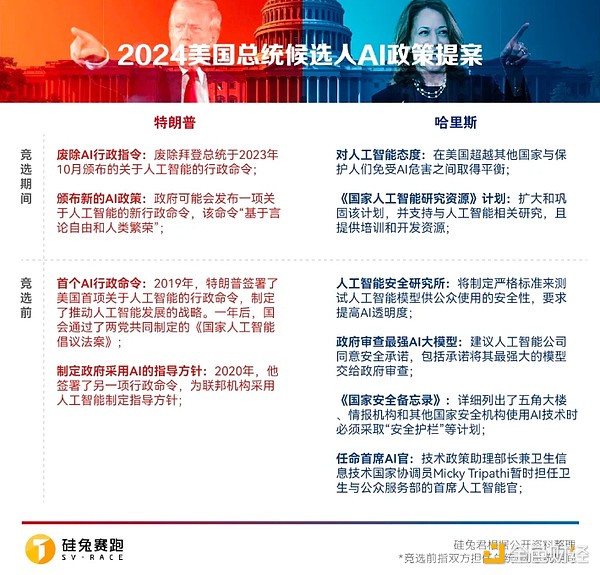
No matter who wins in November, the new president will be at a critical moment in formulating AI policies, and the government's support for technological innovation will also affect the growth of some small businesses in Silicon Valley.
From the existing speeches, Harris will generally continue the policies issued by the Biden-Harris administration on AI, including the AI Research Institute and the National Security Memorandum, and choose to conduct a series of moderate supervision on AI companies to be vigilant against AI risks.
In contrast, Trump has transferred the right to regulate technology to the companies themselves, which will increase the channels for capital to enter or exit to a certain extent, stimulate investment in AI startups, and promote the development of AI.
2. Cryptocurrency: Spending $200 million, the cryptocurrency circle chooses the election "revenge"
During the last election campaign, cryptocurrency was still a niche hobby in the cryptocurrency circle, and neither Trump nor Harris was optimistic about the development of cryptocurrency.
Four years later, everything has changed. The survey shows that during this election, nearly half of the donations to the activities of the two candidates came from cryptocurrency companies, and the crypto companies Coinbase and Ripple became the main force, totaling more than $200 million.
It can be said that after being suppressed by the Biden administration for nearly four years, cryptocurrency entrepreneurs have a deep understanding of the importance of policy support, and they also expect the new president to be a candidate who supports cryptocurrency, rather than a cryptocurrency skeptic like Biden.
Obviously, with the strong support of cryptocurrency entrepreneurs, Harris and Trump have changed their views on cryptocurrency and actively embraced it. The Biden administration may be the last government in the United States to oppose cryptocurrency.
Here are Harris and Trump's views on cryptocurrency:
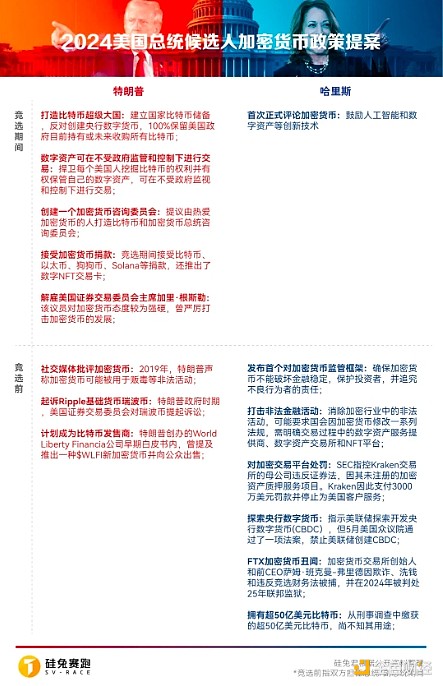
In the early stages of the campaign, Harris, a Democrat, had not made any official comments on cryptocurrency, which also shows that there was some controversy within the party about cryptocurrency. It was not until September that Harris revealed that he would relax his attitude towards cryptocurrency. This means that the Democratic Party still holds a certain cautious attitude towards cryptocurrency, and chooses to moderately encourage Bitcoin innovation while maintaining the rights and interests of relevant investors.
Trump's Republican Party is a staunch supporter of cryptocurrency and will vigorously promote the development of Bitcoin. Both Trump himself and his vice presidential candidate Vance hold cryptocurrency. It is revealed that Vance owns Bitcoin worth up to $250,000.
If Trump succeeds in taking office, cryptocurrency may be seen as a reliable asset and will be used in some traditional investment portfolios in the future. If global investors follow the example of the United States and include Bitcoin in mainstream investment methods, the price of Bitcoin will continue to rise. As of November 1, the price of Bitcoin climbed to $73,000, close to its historical high.
3. Energy and Climate: Harris's New Energy VS Trump's Traditional Energy
Energy has always been a source of power for national and social development, and energy shortage is one of the key issues that the United States urgently needs to solve. The development of innovative technologies and the support of energy policies will affect the future supply and demand changes in the US energy market.
Now, facing the issue of new energy, how will the two candidates balance it? Here are Harris and Trump's views on energy and climate:
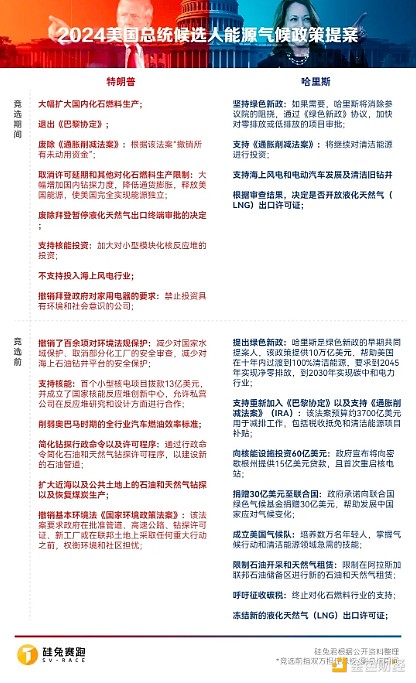
In terms of energy and climate, both candidates want to expand energy production to reduce prices, but they have made almost completely different choices in terms of technology. Harris is clearly more inclined to clean energy and promote the development of clean energy technology, prompting companies to achieve low-carbon emissions and zero emissions.
But Trump hopes to repeal a series of regulations that hinder oil and gas drilling and coal mining, and increase efforts to promote the mining of traditional energy to meet the growing demand for energy.
No matter who wins the election, nuclear energy companies should be able to get support in the future, but some startups focusing on clean technology and clean energy may be deeply affected by the style of the candidates.
3. Will the final judgment change? Tech giants are waiting for a new turn
Silicon Valley giants, like start-ups, are also waiting for the shoe to land.
They are facing another difficult problem: endless lawsuits, countless regulations, and endless taxes... Whether it is the industry newcomer OpenAI, or Silicon Valley giants Nvidia, Apple, Amazon, Meta, and Google, they are all caught in the Biden administration's lawsuits and supervision.
In March of this year, the U.S. Department of Justice, together with 16 states and the District of Columbia, jointly sued Apple for monopoly, accusing it of using illegal anti-competitive behavior to achieve the dominance of the iPhone. In the same year, the U.S. Federal Trade Commission and 17 states took Amazon to court, accusing Amazon of abusing its market position, unfairly promoting its own platforms and services, and damaging fair competition. Google has been in a long-term split crisis.
Will the newly elected president continue the Biden style, or will he let these giants go? We will look at what changes the US election will bring to the giants in Silicon Valley from the three major directions of monopoly, taxation, and technical support.
1. Monopoly: Faced with corporate splits and sky-high monopoly fees, are the giants doomed?
From a historical perspective, the US government has been continuously strengthening its supervision of technology giants, and the relationship between the government and enterprises has become increasingly tense. Now the giants in Silicon Valley have basically been sued by the Biden administration. Multiple antitrust lawsuits and frequent investigations have caused headaches for large companies in Silicon Valley. Even Google's current CEO Sundar Pichai has to admit that Google will be involved in antitrust lawsuits and appeals for "many years."
During this election campaign, the two candidates invariably avoided discussing the antitrust attitude towards technology giants, and only simply expressed some views on technology regulation.
But under the undercurrent, the technology giants have also gained a glimmer of hope. According to the latest reports, the Democratic Party has privately revealed that they have received certain support from Google and other large technology companies. Harris may take "mild penalties" for some existing lawsuits.
Here are Harris and Trump's views on antitrust and regulation of tech giants:
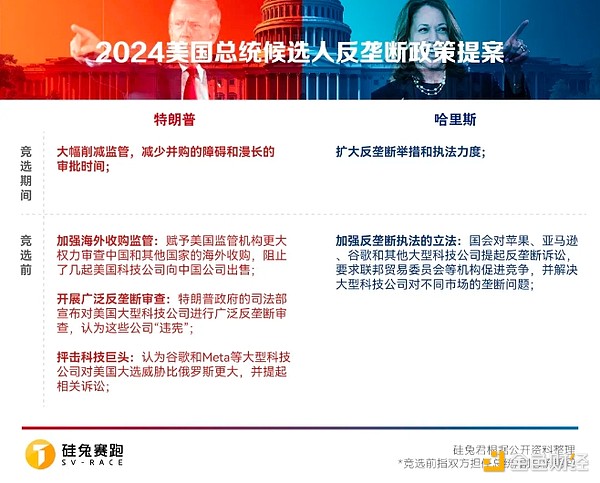
In terms of monopoly, both candidates have adopted a more extensive review of tech giants. But Harris's related policies are more inclined to prevent large technology companies from over-expanding and give startups more room to survive.
Trump continued his previous style of governing, advocating free market policies in the economic direction, encouraging companies to compete on their own and promoting economic development.
There is not much difference between the two in their attitudes towards antitrust, but the measures and methods they take are different. But in terms of regulation, the two candidates are completely different. Harris continues to attach great importance to the regulatory style of the Biden administration and user privacy, data security and other issues. But Trump believes that some technical security issues should be left to companies to solve themselves, without too much intervention.
2. Taxation: Harris's tax increase policy PK Trump's tax reduction policy
Tax issues have always been one of the must-answer questions during the campaign of every US presidential candidate. This time, both candidates elaborated on their future plans for taxation in detail.
If the policy proposals during the campaign are implemented, Harris's tax plan will become the 15th largest tax increase plan since 1940, and the 6th largest tax increase plan during the same period except for wartime. Excluding the tariff part, Trump's tax plan will become the 6th largest tax reduction plan since 1940.
Here are Harris and Trump's views on taxes:
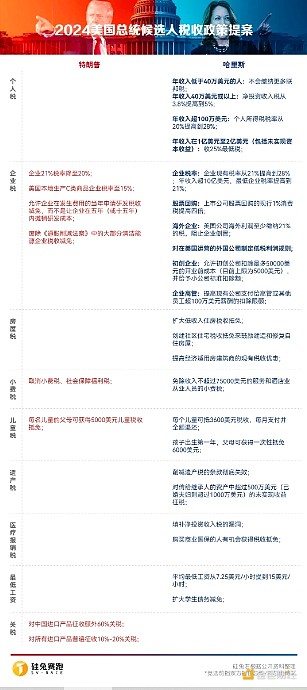
Harris said during the campaign that she would build the middle class by raising taxes on the richest 1% of the American population while cutting taxes on all other income groups.
Trump, on the other hand, chose to cut a series of local taxes in the United States and turn to significantly increase taxes on overseas companies or products.
Judging from Trump's tax policies during his administration, he should continue to relax economic policies on the energy, finance, health care, infrastructure and agricultural sectors, but cross-border transaction costs will rise sharply.
For high-income and corporate people in Silicon Valley, the Republican Trump policy is undoubtedly more favorable and will promote more financial investment. The tax policy of Harris, a Democrat, is targeted at high-income people and beneficial to the vast middle- and low-income groups.
3. Technology investment: Can funds and talents still flow smoothly to Silicon Valley?
Silicon Valley is famous not only for its companies, but also for its gathering of a large number of high-end technical talents and sufficient funds, which can explore more possibilities. The country's training of technical talents and capital investment will also promote the innovative development of Silicon Valley.
The following are Harris and Trump's views on technology investment during the campaign:
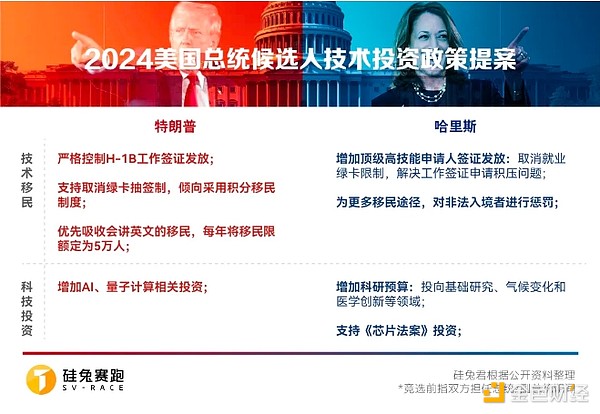
Technological innovation in Silicon Valley has always been inseparable from talent and capital. During Trump's administration, the control of skilled immigrants also increased the difficulty for companies in Silicon Valley to acquire talent to a certain extent. Harris has been encouraging more talents to flow into the United States to solve the problem of labor shortage in the United States.
Silicon Valley may usher in a golden period of development
As the center of global technological innovation, Silicon Valley naturally cannot do without a stable policy environment to support its development and innovation. Judging from the signals released by the two candidates, they both hope to further strengthen the technological power of the United States and are willing to provide more financial and policy support. Silicon Valley may usher in a golden period of development.
However, the two have different focuses in the direction of support. Harris focuses on supporting talents and providing funds, but also requires regulatory giants to increase taxes on high-income companies and people. Trump is willing to cut taxes and support traditional energy industries, but tries to increase tariffs and reduce cross-border transactions.
The policy inclinations of presidential candidates only indicate their future plans to a certain extent, and have limited impact on Silicon Valley, because companies in Silicon Valley pay more attention to the specific policies implemented by governors of various states.
No matter how the policies of the two parties change and differ, the general direction of attaching importance to market mechanisms, making enterprises the main body of innovation, and increasing investment in basic research has not changed. With the slow recovery of the economy after the epidemic, the direction of the global economy will have a more profound impact on the overall trend of scientific and technological innovation and technology investment, and the overall positive trend is unstoppable.
 Brian
Brian













